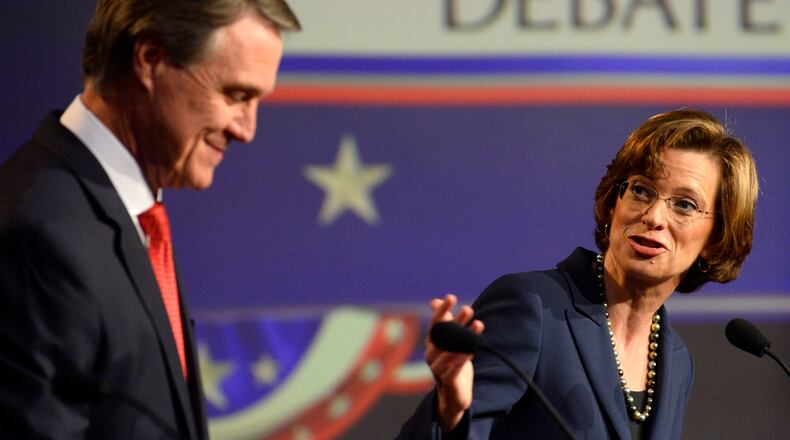Michelle Nunn and David Perdue broke little new ground in the next-to-last televised debate of their bruising U.S. Senate race, although both found areas — albeit narrow — of agreement.
Otherwise, both Nunn, the Democrat, and Republican Perdue spent most of their time in the hourlong debate sticking to the sharpest of their talking points. Nunn belittled Perdue’s business record as an outsourcer of jobs, and Perdue cudgeled Nunn as a rubber stamp for President Barack Obama and Senate Majority Leader Harry Reid, D-Nev.
Meanwhile, Libertarian Amanda Swafford said neither Democrats nor Republicans can be trusted to lead, and she declared herself the logical alternative. She also acknowledged that it is her candidacy that will likely deprive Nunn or Perdue of a majority of the votes on Nov. 4 and force a runoff. If no candidate receives more than 50 percent of the vote, the top two candidates will battle on until January.
Despite Swafford’s animosity toward her opponents, both Perdue and Nunn worked to curry favor with the Libertarian, or at least with her supporters.
Perhaps the most candid moment of the debate came right at the end, when Perdue was asked to defend his record as the CEO of the failed textile firm Pillowtex and as the CEO of Dollar General at time when thousands of women claimed a discriminatory pay scale.
Perdue said Pillowtex had already been in bankruptcy before he took over and failed for good once he left.
“It was a tragedy of national proportions,” Perdue said. “Those were the best workers I ever worked with in the world.”
The company failed, he said, “because of bad government policies. (Entire industries) have been decimated.”
After the debate, Perdue was asked to explain why he pushed Pillowtex to pay him a promised $100,000 moving allowance even though he never actually moved to Kannapolis, N.C., where the company was located.
“Look, I’m not going to get into the details of my contract negotiation,” Perdue said.
Nunn was pressed during the debate about a pair of Equal Employment Opportunity Commission complaints filed against either Nunn or the nonprofit foundation she headed, Points of Light.
“There has never been any EEOC findings about any organization I’ve ever run,” Nunn said, acknowledging that there were complaints but no finding of wrongdoing. “That’s very different than (Perdue’s) record.”
EEOC complaints only become public record if the federal agency rules that discrimination occurred, she said, which didn’t happen.
Nunn perhaps broke new ground Sunday night by saying she would support a bipartisan gun control bill that would require universal background checks to “ensure criminals, terrorists and the mentally unstable do not have access to guns.”
When it came to small-business development and corporate tax rates, Nunn and Perdue found common ground.
“We actually agree on some of those things,” Nunn said after Perdue called for cuts in government regulations and taxes.
Both called for cutting or eliminating the federal corporate income tax, although they disagreed strongly over raising the minimum wage. Nunn supports it; Perdue opposes.
“If you raise the minimum wage 40 percent, which person out of every three working right now would you tell is going to lose a job?” Perdue asked Nunn.
Overall, however, both candidates returned to the typical talking points. When allowed to ask each other a question, Perdue pounced.
Obama, Perdue said, recently said he is not on the ballot but his policies are. “Isn’t a vote for you just a vote for Barack Obama?” he asked Nunn.
Nunn was ready. She said she recently spoke with a farmer who told her to tell Perdue that if “he wanted to run against Harry Reid, he should have moved to Nevada, if he wanted to run against the president, he should run for president.”
When it was Nunn’s turn to ask a question, she, too, returned to familiar territory.
Perdue recently told critics of his experience outsourcing of jobs that they didn’t understand business. But hundreds in Georgia lost jobs while Perdue worked at Sara Lee. “Tell us and the people who lost their jobs in places like Cartersville and Calhoun a little more about business,” Nunn said.
Nunn, Perdue said, was “misstating the facts.” None of the decisions he made at Sara Lee had an impact on Georgia jobs.
“Here’s the truth,” Perdue said. “This president’s failed polices are hurting men and women in Georgia. You know that. Do you have an iPhone? Did you outsource jobs? You have an Apple computer? Did you outsource jobs?”
About the Author
Keep Reading
The Latest
Featured



